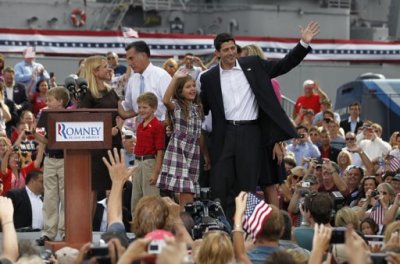Paul Ryan Pick May Energize Debate on Catholic Teaching, Federal Spending
Rep. Paul Ryan (R-Wis.) sparked a debate in April over Catholic social teaching and the priorities in the federal budget. That debate may be resuscitated now that Ryan has been chosen as Mitt Romney's running mate.

The debate began with an Ryan interview on CBN in April. He was asked how his Catholic faith informed the House Republican budget. As chair of the House Budget Committee, Ryan was the primary force behind that budget. It has been dubbed the "Ryan budget" as a result.
Ryan answered that his faith is central to his thinking regarding the federal budget. In particular, he mentioned two principles from Catholic social thought – subsidiarity and preferential option for the poor.
Ryan compared subsidiarity to federalism and said that the "government closest to the people governs best."
"Preferential option for the poor" means that preference should be given to how a public policy impacts the poor before considering everyone else. For Ryan, that meant "don't keep people poor, don't make people dependent on government so that they stay stuck at their station in life."
Ryan also wrote a letter to Cardinal Timothy Dolan, who heads the U.S. Conference of Catholic Bishops, in April 2011, saying that Catholic principles would be taken into consideration when crafting the budget. Dolan responded with a letter in May 2011 saying he appreciated Ryan's assurances.
"The principles of Catholic social teaching contain truths that need to be applied. Thus, one must always exercise prudential judgment in applying these principles while never contradicting the intrinsic values that they protect," Dolan wrote.
Ryan followed that up with a four-page letter to Dolan in April 29, 2011, which provided more detail about what he wished to accomplish with the federal budget.
"The House Budget's overarching concern is to control and end the mortal threat of exploding debt," Ryan wrote.
In response to Ryan's CBN interview, Faith in Public Life, a politically liberal Christian advocacy organization, released a statement calling the Ryan budget "morally indefensible" because it "turns its back on the hungry, the elderly and the sick while giving more tax breaks to the wealthiest few." Fifty-nine religious leaders signed the statement.
Congresswoman Rosa DeLauro (D-Conn.), a Catholic, also joined the debate by writing a letter to Dolan asking him to condemn the Ryan budget.
In a mid-April interview with The Christian Post, DeLauro spoke about how her Catholic faith informs her public policy views. The public policy issues that she cares about – "better jobs, education, affordable health care, protecting the most vulnerable, caring for the environment" – are central to her faith, DeLauro said. Since Jesus cared for the poor, DeLauro reasoned, it is incumbent upon government to not cut programs that provide aid for the poor.
For another perspective on the Ryan budget, The Christian Post also interviewed Rev. Robert Sirico, a Catholic priest and president of Acton Institute. His new book is Defending the Free Market: The Moral Case for a Free Economy.
Sirico believes that Ryan also cares about the poor but is offering a different way to help the poor. While Church teaching says that public policies must consider the poor, Sirico argued that how you go about doing that is based upon prudence. Faithful Catholics can come to different conclusions about what is best for the poor, he said.
"John Paul XXIII said, and I'm paraphrasing, when it comes to applying these principles to the details of legislation, Catholics will have different points of view, and the important thing is that they should engage these things charitably," Sirico explained.
While it is true that God is for the poor, Sirico said, the Bible does not dictate that "the government has to be the recourse of first resort."
The debate on how Catholic and biblical teachings apply to the federal budget could come to the forefront of a public debate now that Ryan will play a more visible role in the November election. The issue has already been raised by Deal Hudson, writing for The Daily Beast, and Jeffrey Weiss, writing for Real Clear Religion.
Weiss predicted that Ryan will be able to energize the Republican base, much like Sarah Palin in 2008, but will be unlikely to mobilize swing Catholic voters to his side because of his budget priorities.
Hudson noted that since Vice President Joe Biden is also Catholic, a contrast could be made between two different styles of Catholicism. Both Biden and Ryan been have been criticized by Catholic bishops: Ryan for his budget priorities and Biden for his pro-choice position on abortion.






























